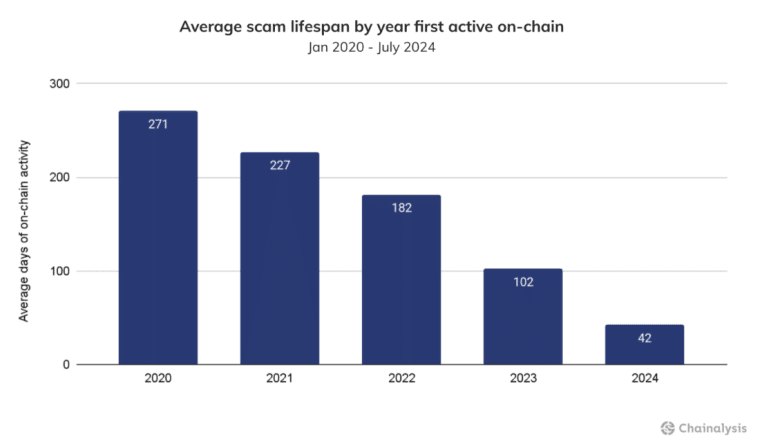In its latest mid-year update, the blockchain analytics firm Chainalysis uncovered some of the most alarming trends in the realm of illicit activities within the digital assets space.
The report, which covers the first semester of 2024, reveals how rapidly scammers are adapting to enhanced security measures and protocols and how persistent and widespread the distribution of materials depicting child sexual abuse has become. Meanwhile, new platforms have also appeared and are currently facilitating cybercrime.

Among its most striking findings, the report unveils a shift in the nature of crypto scams. Data revealed that scammers are now engaging in shorter yet more lucrative campaigns. The investigation claims that the average lifespan of scams has shrunk from 271 days in 2020 to just 42 days as of this year.
The trend uncovers a strategic pivot from criminals who now prefer to act swiftly and siphon money from their victims rapidly to avoid being detected and maximize profitability by increasing the number of victims they target during a certain period.
Pig Butchering Scams are the Latest Profitable Fad Among Criminals
Chainalysis analysts indicate that Ponzi schemes are becoming less frequent while cybercriminals are favoring targeted campaigns. Pig butchering scams have emerged as the most popular scheme along with work-from-home and drainer scams and address poisoning.
Pig-butchering is also the most profitable scheme. This sophisticated type of fraud works by developing long-term relationships with prospective victims, often of a romantic nature, before exploiting them financially.
The report provides a concrete example of the lucrative nature of these scams. A Myanmar-based scam compound, first observed on-chain in 2022, netted at least $101.22 million just this year. This staggering figure emphasizes the industrial scale of some of these operations and the urgent need for enhanced detection and prevention measures from authorities.
Another remarkable finding is that wallets that became active this year accounted for 43% of all scam-produced inflows. This represents a significant increase compared to the 30% reported in 2022. The trend may be reflective of a surge in new scam operations and criminals’ intentions to disguise their operations by creating new on-chain footprints instead of relying on storage instruments they used in the past.
The Persistent Threat of CSAM Networks
This mid-year update from Chainalysis also evidenced a concerning increase in the number of Chinese CSAM (Child Abuse Sexual Materials) distribution networks since late 2023. These facilities now account for a larger share of nearly 40% of the total inflows produced by these activities globally.
Also read: Hackers Increasingly Target Centralized Exchanges as Cyber Crime Evolves
CSAM vendors rely on instant crypto mixers when they want to cash out these proceeds, a prevailing trend since many years ago. These insights reveal the disturbing ease with which these networks can distribute illegal content and exploit children in locations with lax law enforcement efforts.
They have established robust financial structures that allow them to keep profiting from these activities and are not being actively targeted for dismantling by their local governments.
“Based only on the reporting pipeline, it is difficult to say definitively if there is an emergent trend or if these sites have existed for some time but gone unreported to authorities,” a report from the Internet Watch Foundation highlights.
Huione Guarantee – A $49 Billion Online Marketplace for Criminals
https://twitter.com/chainalysis/status/1829129375683326242
The Cambodian online marketplace known as Huione Guarantee – owned by a local conglomerate called the Huione Group was mentioned numerous times in this mid-year report. It has reportedly processed over $49 billion in crypto transactions since 2021 – a figure that far exceeds previous estimates.
Huione Guarantee is reportedly implicated in facilitating a wide range of illegal activities including pig butchering, investment fraud, money laundering, CSAM distribution, and illegal gambling operations.
The platform offers a peer-to-peer (P2P) marketplace that connects buyers and sellers through Telegram groups and they do little to mask the illicit nature of these operations.
The investigation uncovered connections with risky entities including addresses that have been tied to previous criminal incidents, wallets from Russian-based OFAC-sanctioned exchanges, and Chinese gambling establishments.
Huione has also been tied to large organized criminal organizations like KK Park, a pig-butchering compound, the Fully Light Group, and Warner International. These entities are operated by the Kokang families in Myanmar and have all been accused of engaging in criminal activities.
The report reveals an increase in the amount of cryptocurrencies sent to services selling social media accounts, totaling approximately $10.5 million from 2022 to 2024 across 178,000 deposits.
Also read: Study Shows 88% Fail to Report Crypto Holdings to Tax Authorities
These purchased accounts are likely used by scammers to create more convincing online personas for their fraudulent schemes. They are reportedly sold at a price ranging from $5 to $20 per account, which means that criminals may have got ahold of over 2 million profiles that they can use to scam their targets.
These operations, particularly those originating from compounds like KK Park, are displaying a remarkable ability to adapt when it comes to their off-chain presence. They frequently purchase seasoned social media profiles from China-based services to use in their campaigns, making their fraudulent activities more difficult to detect.
What Can Be Done to Prevent the Proliferation of Crypto Crimes Like These?
The rapid evolution of scam tactics combined with the shorter lifespan of individual scam operations presents significant challenges for law enforcement agencies. The ability of criminals to quickly adapt and change the scope and nature of their operations makes traditional investigative methods less effective.
The Chainalysis report uncovers the urgent need for more sophisticated detection and prevention methods. The crypto industry and regulatory bodies must work together to develop more robust systems to identify and mitigate these evolving threats, especially those affecting children.
Given the global nature of these crypto crimes, particularly the China-based CSAM networks and the involvement of Southeast Asian criminal syndicates, increased international cooperation will be crucial in combating these illicit activities effectively.
The persistence and evolution of scams like pig butchering also highlight the ongoing need to educate the public about crypto-related fraud and how these social engineering campaigns typically work. Raising awareness about these sophisticated schemes could help prospective victims recognize and avoid them before it is too late.
